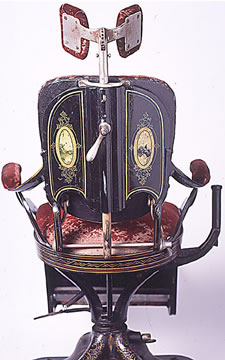“I love it, I love it, and who shall dare
To chide me for loving my dental chair?
For forms that are plump and forms that are spare
Have pressed the plush of my dental chair…”
It’s not every day that someone waxes rhapsodic about a dentist’s chair, but the author was – surprise – a dentist. Walter Rose of Ireland published this doggerel in a 1920 issue of Oral Health. Although he did not lay eyes on this chair, one could imagine Rose rushing for pen and paper anew at the sight of this maroon plush and mahogany frame decorated with bucolic scenes. Built in Toronto circa 1880, it was donated to the dental museum at the Faculty of Dentistry by Dr. James Willmott (U of T’s first dean of dentistry). The chair has a headrest that “suits any style the lady patient’s hair is put up in,” according to one ad. The design also replaced turntable cranks (used to wind up early cars) with levers to reposition the patient.
“Quite soon I will come to the end of my toil,
When I shuffle off this poor mortal coil,
Dismiss my last patient with fatherly air,
And sit down and die in my dental chair.”

Dental Floss
The Rolls Royce of dentist's chairs, circa 1880 Read More





No Responses to “ Dental Floss ”
The quoted verse by the dentist Walter Rose is indeed doggerel. But for full effect it should be sung. I immediately recognized it as a parody of Henry Russell’s 1840 song, “The Old Arm Chair.” Compare the lines: “I love it, I love it, and who shall dare / To chide me for loving my dental chair?” (Rose) with “I love it, I love it, and who shall dare / To chide me for loving that Old Arm Chair?” (Russell). When discussing this 19th-century genre with music-history classes, I often gave renditions of “The Old Arm Chair.” Russell (1812-1900), an English-born songwriter and vocalist, spent a year or two in Toronto in the 1830s before heading for a successful performing career in the U.S.
John Beckwith
Professor Emeritus of Music
Toronto